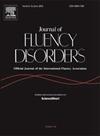Qualitative comparison of stuttering experiences in Chinese and Japanese higher education
IF 2.1
3区 医学
Q1 AUDIOLOGY & SPEECH-LANGUAGE PATHOLOGY
引用次数: 0
Abstract
Purpose
This qualitative study explored students’ stuttering experiences in Chinese and Japanese universities, highlighting and comparing the unique challenges faced by Chinese and Japanese students who stutter (SWS) in higher education settings.
Method
A total of 11 Chinese and 11 Japanese undergraduate SWS participants were involved in this study. Data were collected through semi-structured interviews grounded in the ICF model, focusing on the functional aspects of stuttering, personal and environmental factors, and student activities and participation in university life. Interviews were analyzed using reflexive thematic analysis with NVivo software to identify overarching themes and subthemes.
Results
Reflexive thematic analysis revealed five overarching themes: communication barriers, psychological experiences and coping strategies, public attitudes on campus, limitations of university support services, and expectations regarding university support. Both groups faced communication barriers across academic, social, and career development contexts. Regarding personal factors, both groups expressed negative emotional reactions, particularly challenges in accepting their stuttering. Both groups reported limited university support, with Chinese SWS seeking more specialized counseling, and Japanese SWS expressing a desire for increased awareness of stuttering.
Conclusion
This study highlights how cultural and societal norms shape the stuttering experiences of university students in China and Japan, which were often described in negative terms. These findings underscore the need for culturally responsive, individualized interventions that move beyond the simplistic 'individualism–collectivism' dichotomy and more effectively address the complex needs of SWS in East Asian contexts.
中日两国高等教育中口吃经历的定性比较
目的本定性研究探讨了中日两国大学学生的口吃经历,突出并比较了中日两国在高等教育中口吃学生所面临的独特挑战。方法共11名中国大学生和11名日本大学生参与本研究。数据是通过基于ICF模型的半结构化访谈收集的,重点关注口吃的功能方面、个人和环境因素、学生活动和大学生活的参与。使用NVivo软件对访谈进行反身性主题分析,以确定总体主题和次要主题。结果反思性主题分析揭示了五个总体主题:沟通障碍、心理体验和应对策略、公众对校园的态度、大学支持服务的局限性和对大学支持的期望。这两组人都面临着学术、社会和职业发展背景下的沟通障碍。在个人因素方面,两组人都表达了消极的情绪反应,特别是在接受自己的口吃方面遇到了挑战。两组都报告说大学的支持有限,中国的SWS寻求更专业的咨询,而日本的SWS表示希望提高对口吃的认识。本研究强调了文化和社会规范如何塑造中国和日本大学生的口吃经历,这些经历通常被描述为负面的。这些发现强调了对文化敏感的个性化干预的必要性,这种干预超越了简单的“个人主义-集体主义”二分法,更有效地解决了东亚背景下SWS的复杂需求。
本文章由计算机程序翻译,如有差异,请以英文原文为准。
求助全文
约1分钟内获得全文
求助全文
来源期刊

Journal of Fluency Disorders
AUDIOLOGY & SPEECH-LANGUAGE PATHOLOGY-REHABILITATION
CiteScore
3.70
自引率
14.30%
发文量
23
审稿时长
>12 weeks
期刊介绍:
Journal of Fluency Disorders provides comprehensive coverage of clinical, experimental, and theoretical aspects of stuttering, including the latest remediation techniques. As the official journal of the International Fluency Association, the journal features full-length research and clinical reports; methodological, theoretical and philosophical articles; reviews; short communications and much more – all readily accessible and tailored to the needs of the professional.
 求助内容:
求助内容: 应助结果提醒方式:
应助结果提醒方式:


